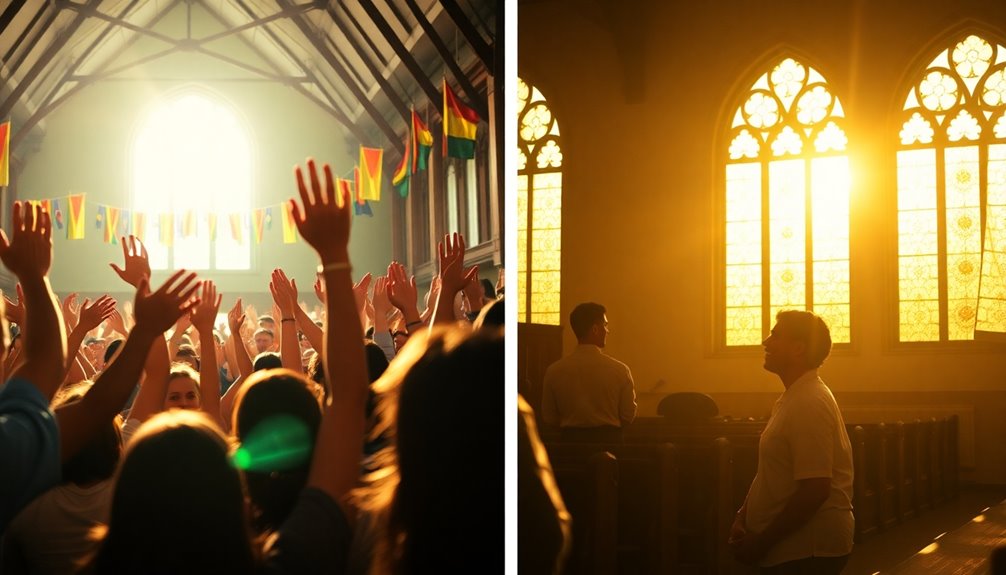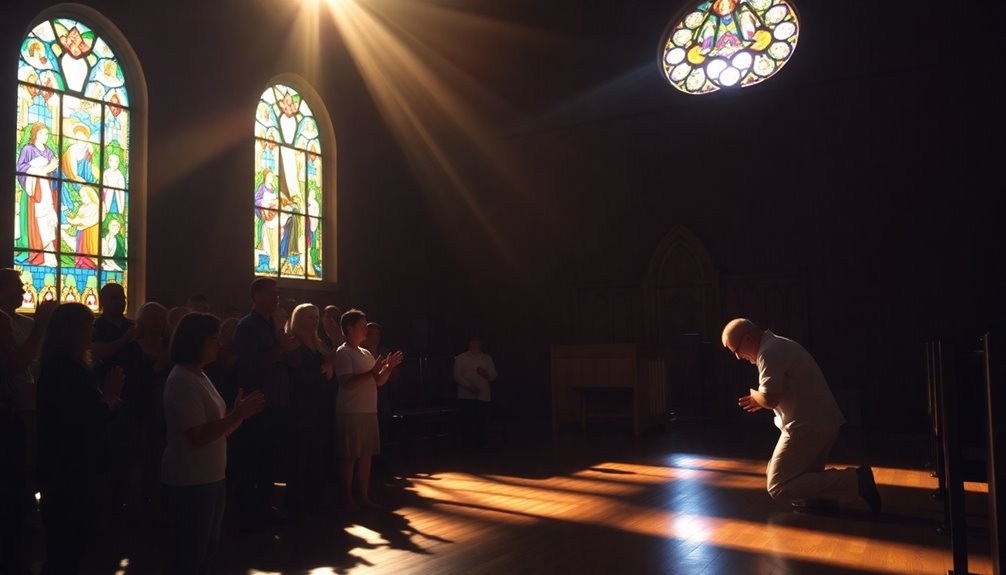Praise and worship are distinct yet connected aspects of your spiritual journey. Praise involves expressing gratitude for God's actions and blessings, often in a joyful, communal setting. In contrast, worship is a deeper, personal act that honors God's intrinsic nature, requiring true heart connection and humility. While praise lays a foundation for worship, the latter goes beyond mere acknowledgment, focusing on intimacy with the Divine. Understanding this difference enriches your spiritual experience and deepens your connection with God. Exploring further can reveal how these elements work together to enhance your faith journey.
Key Takeaways
- Praise is an expression of gratitude for God's actions, while worship is an intimate act of honoring God's intrinsic nature.
- True worship requires a heart connection and genuine humility, differentiating it from mere praise.
- Biblical references highlight that all creation should praise God, while worship must come from the heart in spirit and truth.
- Ancient worship practices involved physical expressions and communal rituals, reflecting diverse cultural expressions of praise and worship.
- Praise serves as a foundation for deeper worship experiences, often leading to richer encounters with the divine.
Introduction

In the journey of faith, understanding the distinction between praise and worship is essential.
Praise is a joyful expression of gratitude for God's deeds, often boisterous and communal, filled with singing and celebration. When you praise, you acknowledge God's greatness, focusing on His actions and blessings in your life. It's a beautiful way to express thanksgiving and connect with others in a spirit of joy.
On the other hand, worship is a deeper, more intimate act reserved solely for God.
It's reflective and personal, requiring a heart connection that goes beyond mere acknowledgment. In worship, you honor God's intrinsic nature and sovereignty with an attitude of humility. This sincerity in worship invites you to engage your spirit fully, seeking a closer relationship with Jesus.
Biblical Basis for Praise

When you explore the biblical basis for praise, you'll find strong commands and examples throughout Scripture that highlight its significance.
Key references, like Psalm 150:6 and Colossians 3:16, show how God calls us to express our acknowledgment of Him in various forms.
Understanding these passages can deepen your appreciation for the role praise plays in your spiritual life.
Primary Bible References
The Bible calls on all creation to lift up praise to God, showcasing a rich tapestry of references that underscore this directive. Psalm 150 invites you to express your praise through singing and playing instruments, reminding you of the joy found in worship.
Romans 15:11 encourages you to praise the Lord among the nations, highlighting the universal nature of this call. In Psalm 100, you're invited to enter God's presence with joyful songs of thanksgiving, emphasizing the importance of acknowledging His goodness.
Jesus teaches in John 4:24 that true worship must come from the heart and be in spirit and truth. This means your worship isn't just about rituals but involves genuine humility and a heartfelt connection with God.
Furthermore, Luke 19:40 illustrates the urgency of praise; if you fail to do so, even the stones will cry out. This shows that praising God isn't optional but an essential part of your faith journey.
Embracing these scriptures, you can understand that praise is a vital expression of your love and reverence for the Lord, deepening your relationship with Him.
Secondary Bible References
Praise, a vital expression of faith, is woven throughout the Scriptures, providing a strong biblical foundation for believers. The Bible commands all creation to praise the Lord, as seen in Psalm 150:6, which states, "Let everything that has breath praise the Lord!"
This directive isn't just for individuals but extends to all of humanity, encouraging communal expressions of joy and thanksgiving. Psalm 98:4 urges, "Make a joyful noise to the Lord, all the earth," highlighting the importance of coming together in worship.
Scripture emphasizes that praise should come from a humble heart and a willing spirit. Psalm 89:5 reminds us of God's everlasting faithfulness, declaring, "Let the heavens praise your wonders."
This universality is echoed in Romans 15:11, where Paul writes, "Praise the Lord, all you Gentiles!"
The command to praise isn't restricted to quiet reflection; it calls for joyful expressions through singing, shouting, and even dancing, as noted in Psalm 150:4.
Ancient Worship Practices Examined

Ancient worship practices reveal a rich tapestry of rituals designed to honor deities and seek their favor. In many cultures, physical expressions like bowing and kneeling showcased reverence and submission to the gods. You'd find communal feasts and sacrifices that not only celebrated the divine but also strengthened community identity among worshippers.
In ancient Israel, temple worship was central, with priests conducting sacrifices and leading the congregation in praise. The use of musical instruments, such as harps and trumpets, was prominent, particularly during the reign of King David, who established musical worship in the Temple. His influence emphasized the importance of hymns and psalms, recited to celebrate the attributes of the deity and reinforce shared beliefs.
These practices created a vibrant atmosphere of devotion, as worshippers united in their expressions of faith. The combination of sacrifices and offerings, communal gatherings, and the melodic sounds of instruments played a crucial role in fostering a sense of belonging within the community.
Through these ancient worship practices, you can see how deep-rooted traditions shaped spiritual life, encouraging a collective connection to the divine.
Cultural Perspectives on Worship

Worship practices across cultures reflect diverse expressions of spirituality and community. You'll notice that cultural expressions of worship can vary widely. In many African and Latin American cultures, worship often involves communal singing and vibrant music, where rhythmic movement celebrates life and unity.
Conversely, Eastern Orthodox and Catholic traditions emphasize liturgy and ritual, focusing on sacramental worship that highlights historical continuity.
When you explore Indigenous cultures, you'll find that worship is deeply connected to the land and nature. Here, the spiritual and physical worlds intertwine, creating a holistic approach to worship practices.
In recent years, the rise of contemporary worship music has transformed how you might experience worship in Western cultures. This shift leans towards informal, emotionally expressive settings characterized by modern instrumentation and personal storytelling, allowing for deeper emotional expressions.
Ultimately, whether through vibrant communal singing, structured liturgy, or nature-inspired rituals, worship remains a powerful vehicle for spiritual connection, reflecting the unique values and beliefs of different communities around the world.
Each cultural perspective enriches the overall tapestry of worship, inviting you to engage in a variety of practices.
Praise Equals Worship's Foundation

You might think worship is all about solemnity, but it actually begins with praise.
By recognizing and celebrating God's deeds, you're establishing a solid foundation for deeper worship.
Understanding this connection can help clear up common misunderstandings about the true purpose of worship.
Debunk Common Misunderstandings
Understanding the distinction between praise and worship can clarify many misconceptions that often arise in spiritual discussions. While praise and worship are essential components of a believer's life, they serve different purposes. Praise celebrates God's deeds, reflecting gratitude and thanksgiving intertwined with worship. It's spontaneous and accessible to everyone.
However, true worship requires humility and a surrendered heart, aligning with the biblical call to worship in spirit and truth. Many people misinterpret praise as synonymous with worship, overlooking the deeper relationship. Praise can happen independently, while worship focuses on honoring God's nature and presence.
To engage in real worship, you must adopt an attitude of the heart that recognizes God's holiness and supremacy. Moreover, understanding that praise often precedes worship in biblical contexts can help you realign your priorities. When you acknowledge God's actions through praise, it sets the stage for deeper, more intimate experiences of true worship.
Misinterpretation of Worship's Purpose
Many people mistakenly equate praise with worship, overlooking the essential distinction between the two. While praise celebrates God's deeds, true worship focuses on honoring His nature and involves deep reverence. This misinterpretation can lead to a superficial worship experience, as genuine worship requires a heart of humility and surrender.
Praise serves as the foundation for worship, as illustrated in Psalm 150, which encourages joyful expressions of gratitude. Recognizing this connection allows you to transition from simply celebrating God's actions to engaging in a deeper, intimate connection with Him.
True worship, as mentioned in John 4:24, is rooted in heartfelt recognition of God's holiness and majesty, transcending mere words or emotions.
When you approach worship with the understanding that it stems from a foundation of praise, you cultivate an atmosphere of reverence that honors God's greatness and faithfulness.
This shift in perspective enriches your worship experience, allowing you to connect with God on a more profound level. So, embrace the role of praise in your worship journey, and watch how it deepens your relationship with God.
Everyday Praise Practices

Everyday praise practices can transform your perspective, starting with simple expressions of gratitude for the blessings in your life.
Whether you're singing along to worship songs during your commute or sharing uplifting moments with friends, these experiences can deepen your connection to God.
Daily Gratitude Expressions
Incorporating daily gratitude expressions into your life can transform how you perceive and appreciate the blessings around you. By keeping a gratitude journal, you can jot down three to five things you're thankful for each day, fostering a habit of praise for God's goodness. This practice encourages reflection and acknowledgment of His daily blessings.
You can weave praise into your everyday routines, like thanking God during your morning coffee or evening meals. These intentional moments help you recognize His presence in your life.
Sharing testimonies of gratitude with friends or family amplifies the joy of praise, creating a communal atmosphere of worship where everyone can celebrate God's deeds together.
Furthermore, expressing gratitude through acts of service—like volunteering or helping others in need—serves as a practical extension of your praise, reflecting God's love and generosity to those around you.
Even utilizing social media platforms to share daily praises, such as a "thankful Thursday" message, can inspire others to recognize and celebrate God's work in their lives.
Embrace daily gratitude expressions, and watch how they enrich your relationship with God and enhance your community.
Congregational Singing Experiences
Congregational singing creates a vibrant atmosphere where believers unite in praise, lifting their voices in gratitude to God. This act of praise is a powerful expression of gratefulness, allowing you to celebrate God's greatness alongside others.
When you participate in congregational singing, you engage in a shared experience that strengthens emotional connections among the congregation. As you sing together, you foster unity and collective worship, creating an uplifting environment that enhances everyone's spirits.
Biblical commands, like those in Psalm 150:4, encourage joyful noise and the use of instruments, reinforcing the importance of this practice in your faith community.
Regularly engaging in congregational singing not only enriches your formal worship but also helps cultivate a habit of praise in your everyday life. When you make singing a part of your routine, you're more likely to acknowledge God's presence and express gratitude outside of church settings.
This continuous practice deepens your relationship with God and encourages a lifestyle filled with praise, transforming each moment into an opportunity to honor Him. Embrace congregational singing as a vital part of your faith journey.
Praise Fuels Worship's Essence

Praise acts as the vibrant spark that ignites the essence of worship, transforming mere acknowledgment into a heartfelt expression of devotion. When you engage in praise, you joyfully acknowledge God's deeds, laying a solid foundation for deeper worship. This recognition of His greatness and faithfulness fosters an attitude of gratitude, preparing your heart to enter an intimate state of worship that reflects surrender and humility.
The sequence of "praise and worship" shows that praising God for His actions helps you develop a profound understanding of who He is. Scriptural examples, like Psalm 95, illustrate how invitations to praise often precede calls to worship, emphasizing that gratitude is essential in your worship experience.
As you praise, you cultivate a dynamic relationship with God. While praise can be spontaneous and public, worship requires a deeper personal connection and commitment.
This journey from praise to worship invites you to acknowledge His presence and love, allowing you to experience a richer relationship with Him. Ultimately, praise fuels the essence of worship, leading you to a more meaningful and transformative encounter with the divine.
Additional Resources

To fully appreciate the nuances between praise and worship, exploring additional resources can be incredibly beneficial.
Start by diving into biblical texts like Psalm 95 and John 4:23-24, which emphasize the importance of worshiping God in spirit and truth. You'll discover that humility is required for true worship, as God sees the heart behind your actions.
Engaging with worship music that highlights both praise and worship can deepen your understanding. Songs that intertwine themes of thanksgiving help illustrate the emotional and spiritual differences between these practices.
Participating in church services where both joyful praise and reflective worship occur will give you practical insights into their interplay.
Consider exploring book resources such as "The Purpose of Praise and Worship" by Dr. Michal Youssef, which offers theological insights and applications.
Additionally, online courses or workshops on worship leadership can provide techniques to cultivate both praise and worship in your personal and communal settings.
Whether through bowing or kneeling or through exuberant singing, each resource helps you grow in your journey of understanding and experiencing the fullness of praise and worship.
Frequently Asked Questions
What Is the Difference Between Praise and Worship?
You might notice that praise and worship serve different purposes in your spiritual life.
Praise is about expressing joy and gratitude for what's been done, often through singing or shouting. It's communal and can feel spontaneous.
Worship, on the other hand, is a deeper, more intimate act where you show reverence and honor for who God is.
It usually requires reflection and a sincere heart, focusing on your relationship with Him.
Which Comes First, Praise or Worship?
When you think about which comes first, you'll find that praise often serves as a precursor to deeper expressions of devotion.
By acknowledging greatness and mighty deeds, you prepare your heart for what's to follow. This joyful recognition sets the stage for a more profound connection, inviting you into a space of reverence.
Embracing this sequence enhances your experience, allowing you to enter into a richer relationship with the divine.
What Is the Difference Between Praise and Worship by Pastor Chris?
Pastor Chris emphasizes the difference between praise and worship by highlighting their distinct purposes and expressions.
When you praise, you express gratitude for God's actions, celebrating His goodness and blessings. It's often lively and communal.
In contrast, worship is about deep reverence for God's holiness and character. It requires a heart connection and humility, drawing you into a more intimate relationship with Him.
Both are vital, but they serve different roles in your spiritual journey.
What Is the Difference Between Praise and Worship by TD Jakes?
TD Jakes emphasizes that praise is your joyful expression of gratitude for God's deeds, while worship goes deeper, focusing on who God truly is.
You can experience praise spontaneously, often publicly, through vocal and physical expressions. In contrast, worship requires a personal connection, reflecting humility and surrender.
Jakes suggests that praise prepares your heart for a more profound encounter with God, allowing you to transition into a deeper, more intimate relationship with Him.










